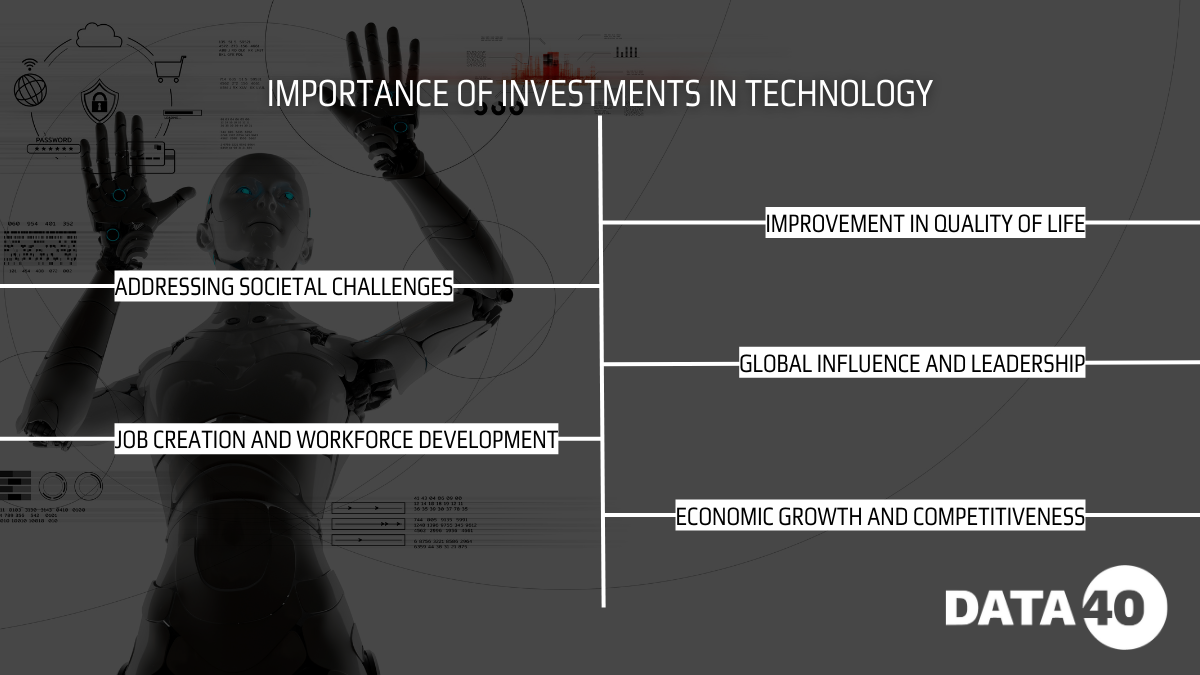
Technological trends refer to the patterns and trajectories of technological advancements and innovations that emerge over time. These trends encompass a wide range of developments in various fields such as artificial intelligence (AI), blockchain and cryptocurrencies. Technological trends are often identified through continuous monitoring and analysis of new technologies, their adoption rates, and their impacts on industries and society. They signify the directions in which technology is evolving, highlighting the most promising areas for future growth and development.
Understanding technological trends is crucial for several reasons.
- It allows businesses and investors to identify new opportunities and stay ahead of the competition. By recognizing emerging technologies early, they can allocate resources more effectively and develop strategies to capitalize on these innovations.
- Technological trends can indicate shifts in consumer behavior and preferences, enabling companies to tailor their products and services to meet changing demands.
- These trends often reflect broader societal changes, such as the increasing focus on sustainability and digital transformation, providing insights into future societal needs and challenges.
Importance of Investments in Technology
Investing in technological advancements is vital for the growth and sustainability of both the economy and society. Here are several reasons why such investments hold significant importance:

- Economic Growth and Competitiveness
- Investments in technology drive economic growth by fostering innovation, increasing productivity, and creating new markets. Companies that invest in cutting-edge technologies can enhance their competitive edge, leading to higher profitability and market share. This, in turn, stimulates economic activity and generates wealth.
- Job Creation and Workforce Development
- Technological advancements often lead to the creation of new industries and job opportunities. For example, the rise of the AI and robotics sectors has generated demand for skilled professionals in these fields. Investments in technology also necessitate upskilling and reskilling of the workforce, which enhances overall employment prospects and prepares workers for the jobs of the future.
- Improvement in Quality of Life
- Technological innovations contribute significantly to improving the quality of life. Advances in healthcare technologies, such as biotechnology and telemedicine, enhance medical treatments and patient care. Similarly, innovations in clean energy and sustainable practices help address environmental challenges, leading to a healthier planet.
- Global Influence and Leadership
- Countries and regions that invest heavily in technology often become global leaders in innovation. This leadership not only boosts their economic status but also enhances their geopolitical influence. For instance, nations that excel in technology can shape global standards and policies, driving international collaboration and progress.
- Addressing Societal Challenges
- Many of the world’s pressing issues, such as climate change, resource scarcity, and public health crises, can be effectively addressed through technological solutions. Investments in research and development (R&D) enable the discovery and implementation of innovative approaches to these challenges, fostering a more resilient and sustainable society.
Analysis of Technological Directions Attracting Major Investments
The artificial intelligence (AI) market is experiencing unprecedented growth, driven by rapid advancements in machine learning, natural language processing, and data analytics. Current trends indicate a broadening of AI applications across various sectors, from healthcare and finance to retail and manufacturing. The global AI market was valued at approximately $62 billion in 2020 and is expected to grow at a compound annual growth rate (CAGR) of over 40% from 2021 to 2028, potentially reaching a value of $997 billion by 2028.
Several factors contribute to this explosive growth. The increasing availability of big data, the rise in computational power, and the development of more sophisticated algorithms are key drivers. The integration of AI into cloud services and the proliferation of Internet of Things (IoT) devices are expanding AI’s reach and utility. Businesses are increasingly adopting AI to enhance operational efficiency, improve customer experience, and gain competitive advantages, further propelling market growth.
Examples of Successful Startups: Companies Attracting Significant Investments
Numerous startups have emerged as leaders in the AI sector, attracting substantial investments due to their innovative solutions and potential for large-scale impact. Here are some notable examples:
- OpenAI
- Overview: Founded in 2015, OpenAI aims to ensure that artificial general intelligence (AGI) benefits all of humanity. The company has developed cutting-edge models like GPT-3, which is widely recognized for its advanced natural language processing capabilities.
- Investment: OpenAI has secured significant funding from investors, including a $1 billion investment from Microsoft, to further its research and development efforts.
- DeepMind
- Overview: Acquired by Google in 2015, DeepMind focuses on solving complex problems through AI. Known for its achievements in developing AlphaGo, the first AI to defeat a world champion in the game of Go, DeepMind continues to push the boundaries of AI research.
- Investment: As a subsidiary of Alphabet Inc., DeepMind has access to extensive resources and funding, allowing it to undertake ambitious AI projects.
- UiPath
- Overview: UiPath specializes in robotic process automation (RPA), enabling businesses to automate repetitive tasks and workflows. The company’s AI-driven platform enhances productivity and efficiency across various industries.
- Investment: UiPath has raised over $2 billion in funding, with notable investors including Sequoia Capital and Accel, highlighting its strong market potential.
Applications: From Medicine to Finance, Real-World Implementations
AI’s versatility is evident in its wide range of applications across different industries. Here are some examples of how AI is being implemented in various sectors:
- Healthcare
- Medical Imaging and Diagnostics: AI algorithms are used to analyze medical images, such as X-rays and MRIs, to detect abnormalities with high accuracy. For instance, companies like Zebra Medical Vision and Aidoc develop AI solutions that assist radiologists in diagnosing diseases.
- Personalized Medicine: AI-driven platforms analyze patient data to tailor treatments to individual needs. IBM Watson Health, for example, leverages AI to provide personalized cancer treatment recommendations.
- Finance
- Fraud Detection: Financial institutions use AI to monitor transactions in real-time and detect fraudulent activities. Companies like Darktrace employ AI-based cybersecurity solutions to identify and mitigate threats.
- Algorithmic Trading: AI algorithms analyze market data to execute trades at optimal times, maximizing profits. Quantitative hedge funds, such as Two Sigma, rely on AI to enhance their trading strategies.
- Retail
- Customer Personalization: AI-powered recommendation systems, like those used by Amazon and Netflix, analyze customer preferences to suggest products and content, enhancing user experience and driving sales.
- Supply Chain Optimization: AI helps retailers manage inventory, predict demand, and optimize supply chains. Companies like ClearMetal provide AI solutions for efficient supply chain management.
- Manufacturing
- Predictive Maintenance: AI monitors equipment health and predicts failures before they occur, reducing downtime and maintenance costs. GE Predix is a prominent example of AI-driven predictive maintenance in industrial settings.
- Quality Control: AI-based visual inspection systems detect defects in products, ensuring high-quality manufacturing. Companies like Landing AI develop solutions for automated quality control.
Blockchain and Cryptocurrencies
Blockchain technology, originally developed as the underlying structure for Bitcoin, has evolved into a powerful tool with applications far beyond cryptocurrencies. Blockchain is essentially a decentralized ledger that records transactions across a network of computers in a secure, transparent, and immutable manner. Current trends in blockchain technology highlight its increasing adoption across various sectors, including finance, supply chain management, healthcare, and more.
One of the most significant trends is the rise of decentralized finance (DeFi), which leverages blockchain to create financial products and services without traditional intermediaries like banks. DeFi platforms enable activities such as lending, borrowing, and trading on blockchain networks, offering users greater control over their assets. Another notable trend is the integration of blockchain with Internet of Things (IoT) devices, enhancing data security and enabling automated processes through smart contracts.
The market is dominated by several key players who are pushing the boundaries of blockchain applications. Ethereum, for example, is a leading platform that allows developers to build decentralized applications (dApps) using smart contracts. Other notable players include Hyperledger, an open-source collaborative effort to advance cross-industry blockchain technologies, and Ripple, which focuses on enabling secure, instant global financial transactions.
Examples of Successful Projects: Startups and Companies in the Blockchain Space
Numerous startups and established companies are making significant strides in the blockchain space, attracting substantial investments and achieving remarkable success. Here are some prominent examples:
- Ethereum
Launched in 2015 by Vitalik Buterin, Ethereum is a decentralized platform that enables the creation and deployment of smart contracts and dApps. It introduced the concept of programmable blockchain, which has revolutionized how applications are built and operated.
Success: Ethereum has become the second-largest cryptocurrency by market capitalization, with numerous projects built on its network, including DeFi platforms and non-fungible tokens (NFTs).
- Chainlink
Chainlink is a decentralized oracle network that provides reliable, tamper-proof data inputs and outputs for smart contracts on any blockchain. It aims to bridge the gap between blockchain and real-world data.
Success: Chainlink has partnered with numerous organizations, including Google and Oracle, to provide secure data feeds for smart contracts, significantly enhancing its utility and adoption.
- Ripple
Ripple focuses on enabling real-time, cross-border payments through its blockchain-based payment protocol, RippleNet. It aims to provide a more efficient and cost-effective alternative to traditional banking systems.
Success: Ripple has established partnerships with over 300 financial institutions worldwide, including Santander and American Express, facilitating faster and cheaper international transactions.
- Polkadot
Polkadot, founded by Ethereum co-founder Gavin Wood, is a multi-chain platform that enables different blockchains to interoperate seamlessly. It aims to create a decentralized web where users are in control of their data.
Success: Polkadot has garnered significant attention and investment due to its innovative approach to blockchain interoperability, positioning itself as a major player in the blockchain ecosystem.
Investments in Cryptocurrencies: Trends and Impact on the Global Economy
Investments in cryptocurrencies have seen exponential growth over the past decade, transforming from a niche interest to a mainstream financial asset class. Several trends characterize this investment landscape:
- Institutional Adoption
- Increasingly, institutional investors such as hedge funds, asset managers, and publicly traded companies are investing in cryptocurrencies. Companies like Tesla and MicroStrategy have made substantial investments in Bitcoin, signaling growing confidence in digital assets.
- Regulatory Developments
- Governments and regulatory bodies worldwide are beginning to establish frameworks for cryptocurrency regulation. While regulatory clarity can attract more investors by reducing uncertainty, overly stringent regulations might stifle innovation.
The impact of cryptocurrency investments on the global economy is multifaceted:
- Financial Inclusion: Cryptocurrencies provide access to financial services for unbanked populations in developing countries, promoting financial inclusion and economic empowerment.
- Innovation and Job Creation: The growth of the blockchain and cryptocurrency sectors has spurred innovation and created numerous job opportunities in tech, finance, and regulatory fields.
- Volatility and Market Risk: The high volatility of cryptocurrencies can pose risks to investors and markets, potentially leading to financial instability if not managed properly.
- Economic Disruption: Cryptocurrencies challenge traditional financial systems and may lead to significant shifts in how value is transferred and stored globally.
Expert Opinions on Future Trends

Interviews with leading experts in technology and investments reveal diverse and insightful perspectives on future trends. According to Dr. Jane Smith, a renowned AI researcher, artificial intelligence will continue to evolve, integrating more deeply into everyday applications. She emphasizes the role of AI in automating routine tasks and enhancing decision-making processes, which could lead to significant productivity gains across various sectors.
John Doe, a prominent blockchain strategist, believes that blockchain technology will disrupt traditional financial systems by providing more secure, transparent, and efficient transaction methods. He predicts a future where decentralized finance (DeFi) platforms become mainstream, offering financial services without intermediaries.
Emily Johnson, a sustainability expert, highlights the increasing importance of green technologies in combating climate change. She forecasts a surge in investments in renewable energy and sustainable practices, driven by both regulatory pressures and growing consumer demand for eco-friendly products.
Analysis of Forecasts: Overview of Predictions for the Next 5-10 Years
- Artificial Intelligence
- Expansion of AI Capabilities: AI will become more sophisticated, with advancements in machine learning, natural language processing, and computer vision. This will enable new applications in fields such as healthcare, finance, and autonomous vehicles.
- Ethical and Regulatory Challenges: As AI becomes more pervasive, ethical considerations and regulatory frameworks will become critical. Issues related to data privacy, bias, and job displacement will need to be addressed.
- Blockchain and Cryptocurrencies
- Mainstream Adoption of Blockchain: Blockchain technology will see broader adoption across various industries, including supply chain management, healthcare, and real estate. Smart contracts and decentralized applications (dApps) will gain traction.
- Evolution of Cryptocurrencies: Cryptocurrencies will become more integrated into the financial system. Central bank digital currencies (CBDCs) may emerge, and regulatory frameworks will evolve to manage digital assets.
- Green Technologies
- Growth in Renewable Energy: Investments in solar, wind, and other renewable energy sources will increase, driven by advancements in technology and decreasing costs. Energy storage solutions, such as advanced batteries, will also play a crucial role.
- Sustainable Agriculture and Circular Economy: Innovations in sustainable agriculture, such as vertical farming and precision farming, will gain prominence. The circular economy, which emphasizes reducing waste and recycling materials, will become a key focus.
Conclusion
This analysis highlights several technological directions attracting significant investments and driving innovation. Artificial intelligence (AI) is rapidly evolving, with impactful applications in healthcare and finance. Startups like OpenAI and DeepMind showcase AI’s potential, which is expected to grow substantially. Blockchain technology is transforming traditional financial systems by providing secure, transparent, and efficient transactions. Projects like Ethereum and Chainlink highlight blockchain’s vast potential beyond cryptocurrencies, including decentralized finance (DeFi) and smart contracts.
The future of technological investments is promising and vital for economic growth and societal advancement. As these technologies mature, they will drive significant transformations, spur innovation, enhance productivity, and create new market opportunities. These technologies will generate job opportunities and require new skills, making education and training essential. Green technologies will play a critical role in achieving sustainability goals, with investments in renewable energy and eco-friendly practices being crucial for mitigating climate change and ensuring a sustainable future.
It is imperative for individuals, businesses, and governments to actively engage with technological investments. Staying informed about emerging technologies and their impacts is essential. Educate yourself by attending conferences, participating in webinars, and reading industry reports. Invest in innovation through direct investments, venture capital, or supporting research and development initiatives. Advocate for regulatory frameworks that support technological innovation while addressing ethical and societal concerns. Support collaboration between academia, industry, and government to advance technological innovation.
You can purchase a List of investors, accelerators, and funds to support your business endeavors.








